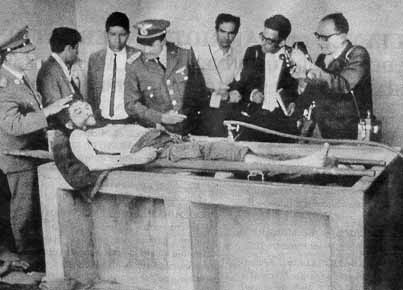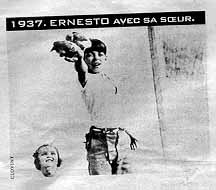Difficulties
This is my first attempt at writing a column/public diary. It is more difficult than I thought. There are so many things noteworthy, so many different themes to select from, and also a lot of voices I could sneak myself into. A general belief suggests for that matter to be yourself, to speak naturally.
To me it isn't very helpful. I'm looking hard for this natural voice, but I'm suspicious. I mean, how can a voice be natural? Isn't a distinct voice always a coup-de-force, something of an outbreak?
Flame
A couple of weeks ago, I saw "Flame", a movie depicting the independence war of Zimbabwe through the eyes and deeds of a woman warrior. Now, I have to confess: I have a weakness for strong women. Killer-ladies. Especially on the screen. Why? It's simple: heroes in cinema abound, but heroines are scarce. Bad characterization is common for both genders, but since you hardly get to see movies that portray heroines, I tend to be more lenient with bad portraits of heroines than with bad portraits of heroes.
Ok, ok, stop the bullshit, heroines turn me on. They incarnate some kind of bloated mother image, but without imposing the usual sexual barrier. In other words, a heroine is a mother whom you can have sex with. Violent, invincible, upright and beautiful, heroines are hard to resist. Ask Riddley Scott, purveyor of "Nikita", "Thelma & Louise" and "G.I. Jane".
Anyway, "Flame" isn't meant to play with those kind of fantasies (which made me want to see it even more eagerly). "Flame" is a so-called third-world movie, albeit financed with western money, making a couple of statements on the situation of women in the Zimbabwean army and society. It was screened on a Sunday afternoon in the context of a women's festival in "De Balie", a well-known cultural center in Amsterdam. The programme contained only movies directed by non-western women. Interistingly, 90% of the public was female and non-western too.
Flame is a village girl who doesn't ask anything special from life. She awaits the right man to marry, except that the political situation of her country comes across her plans. Flame's father is killed by the Rhodesian army, and she decides to join the liberation forces, a guerilla army fighting to expel the western government and declare independence for Zimbabwe. She is only partly driven by a sense of revenge. A good-looking fighter whom she met previously, is waiting for her in a distant camp.
She has to travel a long distance until she reaches the camp. Life there is hard. The training is strenuous, there is not enough food, and women are buckled under a male-only commandment. Flame gets raped by a high rank officer. She can forget about the promised lover, because he won't settle with a non-virgin. Flame gets pregnant. The officer asks for repentance. She forgives him. In the meantime, her boldheartedness and her fighting spirit become appreciated by her superiors. She gets more missions and higher responsibilities.
Flame gives birth to her child on a truck. Back in the training camp, companions help raising her child in between commando expeditions. Soon she becomes a legendary figure, forcing the admiration of brothers and sisters in arm. But when her camp gets bombed by Rhodesian stealth planes, both child and father of child gets killed. She has lost everything.
After the independence for Zimbabwe has been won, another war irrupts for Flame, one that deals with acceptance and recognition of women in society. Flame is a rebel with many causes that transcends her. She's fighting in the dark, but the voice that guides her is her own. And it's a persistent one, echoing long after the curtains have been drawn.
Che Guevara
On the same note of guerilla fighters and inner voices, a word on the Che wouldn't be misplaced. Thirty years ago, Che Guevara was assassinated in the Bolivian mountainside. His popularity has never been as important as today. In october, a few thousand people will gather at Villagrande, near La Higuera, where he lived his last days. Biographies are being published at an accelerated rate, and his powerful portrait adorn more and more T-shirts and magazines alike.
Alerted by Bolivian farmers, the army chased Che and seventeen of his men in the Andean cordillera in what would be his last battle. The guerilleros had no chance to make it alive, outnumbered and worn down as they were. The Che was captured, and the order to execute him came from La Paz. After his execution, the authorities displayed his body in a hospital's ward. The picture that toured the world and in which he was seen in a Christlike posture soon entered the iconography of the twentieth century.
His story is one that blends courage and naivety, romance, friendships and betrayals, sheer idealism and vile diplomacy. Che dreamt of a better world, but the building block of his vision was a perfect man. More than once, he was pointed to this fact by sympathizers. But he didn't believe them. Maybe he didn't care. Maybe he didn't know how real men had to fit into his ideas? What could he make out of the quest for power, corruption or greed? Or maybe he didn't listen. Maybe he could only listen to this inner voice of his. But what was it muttering?
As a child, the Che was heavily asthmatic. His mother, who was fighting her own war in a society of men, raised him with much tenderness and generosity. Her stand was that if her son's life was endangered by asthma, the kid should take as much as he could from it. But he was a solid boy, strengthened by the activities in the open, and he went through each crisis undamaged.
The Che, who had infuriated both his enemies and his allies by his lack of compromise, didn't want to listen to anyone. He wouldn't settle with less than a revolution for all, with or without the Soviets. Castro, who took side along the Soviets, had politely shaken him off his court, so the Che decided to start everything from scratch with a fistful of men.
Betrayed by ignorant peasants and tracked down by well-fed troops in the Bolivian heights, thirsty and sick and (b)eaten by insects, Che's life resembled that of an asthma stricken boy again. In front of the execution squad, maybe that voice of his echoed in his skull, evoking the one and only true complicity he had known with his mother. And that voice was probably enjoining him to stick tight, until the sound of the machine-gun burst.
© Daniel Szmulewicz, 1996 - 2011


